Analyzing the Impact of Long Working Hours on Nurses' Well-being
VerifiedAdded on 2023/03/31
|5
|982
|346
Essay
AI Summary
This essay explores the challenges faced by nurses due to long working hours in healthcare settings and its impact on their health and the quality of patient care. It highlights the negative consequences of extended shifts, including sleep deprivation, fatigue, and increased risk of medical errors. The essay also discusses the importance of adequate rest and personal time for nurses to maintain their mental and physical well-being, emphasizing the need for healthcare organizations to address this issue to ensure better services and patient outcomes. The research draws on various studies and scientific evidence to support its claims, ultimately arguing that nurses' rights to safe and healthy living should be prioritized.
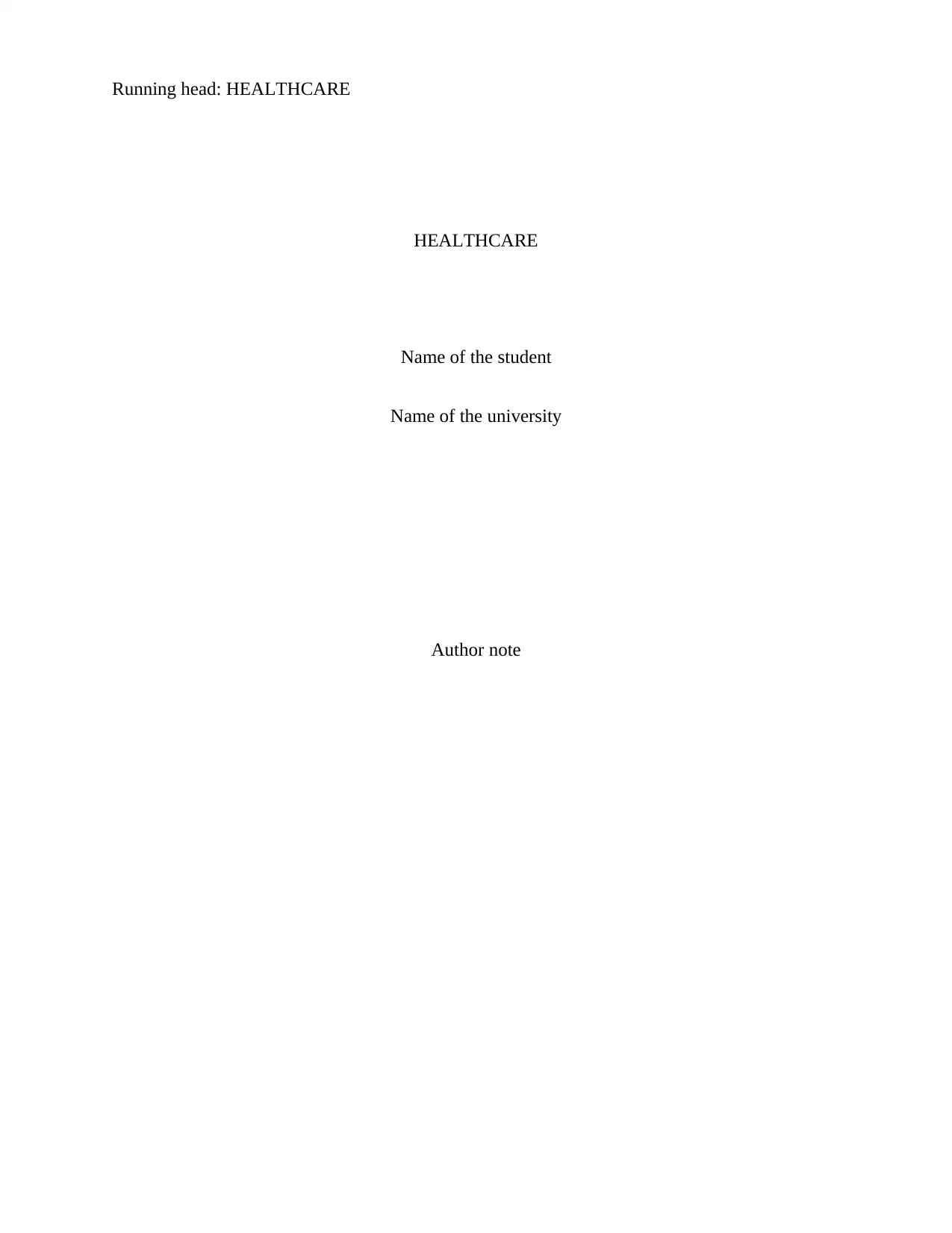
Running head: HEALTHCARE
HEALTHCARE
Name of the student
Name of the university
Author note
HEALTHCARE
Name of the student
Name of the university
Author note
Paraphrase This Document
Need a fresh take? Get an instant paraphrase of this document with our AI Paraphraser
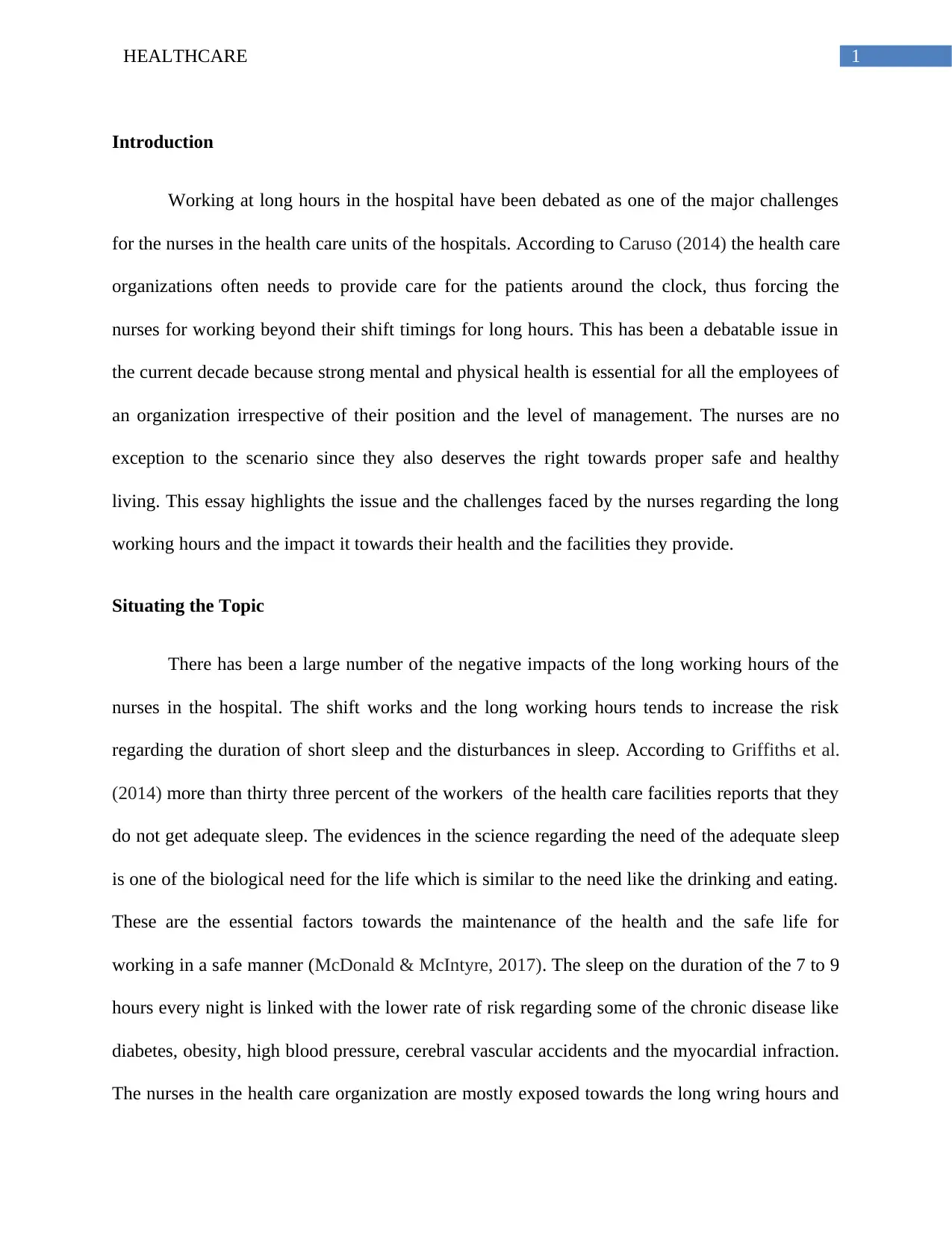
HEALTHCARE 1
Introduction
Working at long hours in the hospital have been debated as one of the major challenges
for the nurses in the health care units of the hospitals. According to Caruso (2014) the health care
organizations often needs to provide care for the patients around the clock, thus forcing the
nurses for working beyond their shift timings for long hours. This has been a debatable issue in
the current decade because strong mental and physical health is essential for all the employees of
an organization irrespective of their position and the level of management. The nurses are no
exception to the scenario since they also deserves the right towards proper safe and healthy
living. This essay highlights the issue and the challenges faced by the nurses regarding the long
working hours and the impact it towards their health and the facilities they provide.
Situating the Topic
There has been a large number of the negative impacts of the long working hours of the
nurses in the hospital. The shift works and the long working hours tends to increase the risk
regarding the duration of short sleep and the disturbances in sleep. According to Griffiths et al.
(2014) more than thirty three percent of the workers of the health care facilities reports that they
do not get adequate sleep. The evidences in the science regarding the need of the adequate sleep
is one of the biological need for the life which is similar to the need like the drinking and eating.
These are the essential factors towards the maintenance of the health and the safe life for
working in a safe manner (McDonald & McIntyre, 2017). The sleep on the duration of the 7 to 9
hours every night is linked with the lower rate of risk regarding some of the chronic disease like
diabetes, obesity, high blood pressure, cerebral vascular accidents and the myocardial infraction.
The nurses in the health care organization are mostly exposed towards the long wring hours and
Introduction
Working at long hours in the hospital have been debated as one of the major challenges
for the nurses in the health care units of the hospitals. According to Caruso (2014) the health care
organizations often needs to provide care for the patients around the clock, thus forcing the
nurses for working beyond their shift timings for long hours. This has been a debatable issue in
the current decade because strong mental and physical health is essential for all the employees of
an organization irrespective of their position and the level of management. The nurses are no
exception to the scenario since they also deserves the right towards proper safe and healthy
living. This essay highlights the issue and the challenges faced by the nurses regarding the long
working hours and the impact it towards their health and the facilities they provide.
Situating the Topic
There has been a large number of the negative impacts of the long working hours of the
nurses in the hospital. The shift works and the long working hours tends to increase the risk
regarding the duration of short sleep and the disturbances in sleep. According to Griffiths et al.
(2014) more than thirty three percent of the workers of the health care facilities reports that they
do not get adequate sleep. The evidences in the science regarding the need of the adequate sleep
is one of the biological need for the life which is similar to the need like the drinking and eating.
These are the essential factors towards the maintenance of the health and the safe life for
working in a safe manner (McDonald & McIntyre, 2017). The sleep on the duration of the 7 to 9
hours every night is linked with the lower rate of risk regarding some of the chronic disease like
diabetes, obesity, high blood pressure, cerebral vascular accidents and the myocardial infraction.
The nurses in the health care organization are mostly exposed towards the long wring hours and
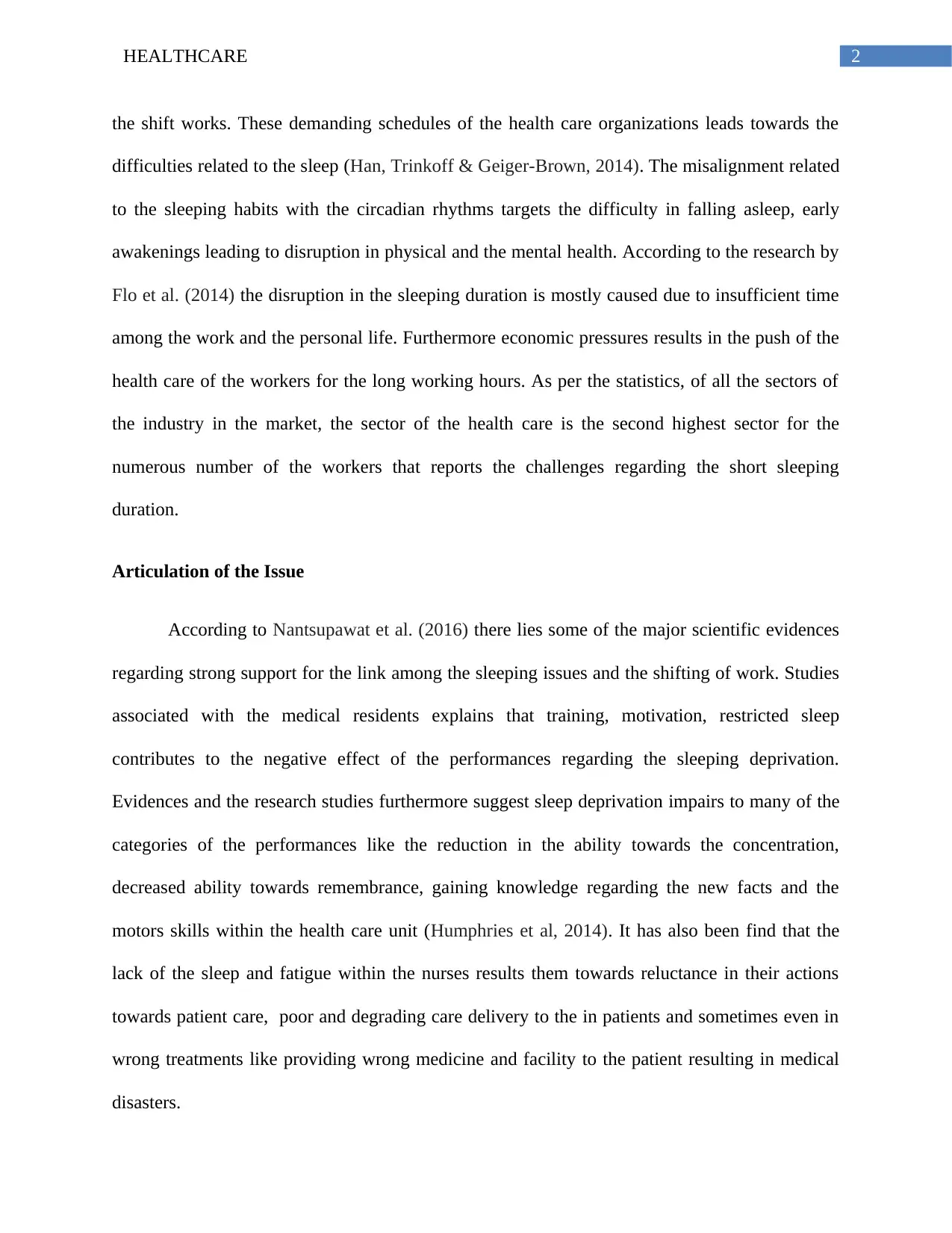
2HEALTHCARE
the shift works. These demanding schedules of the health care organizations leads towards the
difficulties related to the sleep (Han, Trinkoff & Geiger-Brown, 2014). The misalignment related
to the sleeping habits with the circadian rhythms targets the difficulty in falling asleep, early
awakenings leading to disruption in physical and the mental health. According to the research by
Flo et al. (2014) the disruption in the sleeping duration is mostly caused due to insufficient time
among the work and the personal life. Furthermore economic pressures results in the push of the
health care of the workers for the long working hours. As per the statistics, of all the sectors of
the industry in the market, the sector of the health care is the second highest sector for the
numerous number of the workers that reports the challenges regarding the short sleeping
duration.
Articulation of the Issue
According to Nantsupawat et al. (2016) there lies some of the major scientific evidences
regarding strong support for the link among the sleeping issues and the shifting of work. Studies
associated with the medical residents explains that training, motivation, restricted sleep
contributes to the negative effect of the performances regarding the sleeping deprivation.
Evidences and the research studies furthermore suggest sleep deprivation impairs to many of the
categories of the performances like the reduction in the ability towards the concentration,
decreased ability towards remembrance, gaining knowledge regarding the new facts and the
motors skills within the health care unit (Humphries et al, 2014). It has also been find that the
lack of the sleep and fatigue within the nurses results them towards reluctance in their actions
towards patient care, poor and degrading care delivery to the in patients and sometimes even in
wrong treatments like providing wrong medicine and facility to the patient resulting in medical
disasters.
the shift works. These demanding schedules of the health care organizations leads towards the
difficulties related to the sleep (Han, Trinkoff & Geiger-Brown, 2014). The misalignment related
to the sleeping habits with the circadian rhythms targets the difficulty in falling asleep, early
awakenings leading to disruption in physical and the mental health. According to the research by
Flo et al. (2014) the disruption in the sleeping duration is mostly caused due to insufficient time
among the work and the personal life. Furthermore economic pressures results in the push of the
health care of the workers for the long working hours. As per the statistics, of all the sectors of
the industry in the market, the sector of the health care is the second highest sector for the
numerous number of the workers that reports the challenges regarding the short sleeping
duration.
Articulation of the Issue
According to Nantsupawat et al. (2016) there lies some of the major scientific evidences
regarding strong support for the link among the sleeping issues and the shifting of work. Studies
associated with the medical residents explains that training, motivation, restricted sleep
contributes to the negative effect of the performances regarding the sleeping deprivation.
Evidences and the research studies furthermore suggest sleep deprivation impairs to many of the
categories of the performances like the reduction in the ability towards the concentration,
decreased ability towards remembrance, gaining knowledge regarding the new facts and the
motors skills within the health care unit (Humphries et al, 2014). It has also been find that the
lack of the sleep and fatigue within the nurses results them towards reluctance in their actions
towards patient care, poor and degrading care delivery to the in patients and sometimes even in
wrong treatments like providing wrong medicine and facility to the patient resulting in medical
disasters.
⊘ This is a preview!⊘
Do you want full access?
Subscribe today to unlock all pages.

Trusted by 1+ million students worldwide
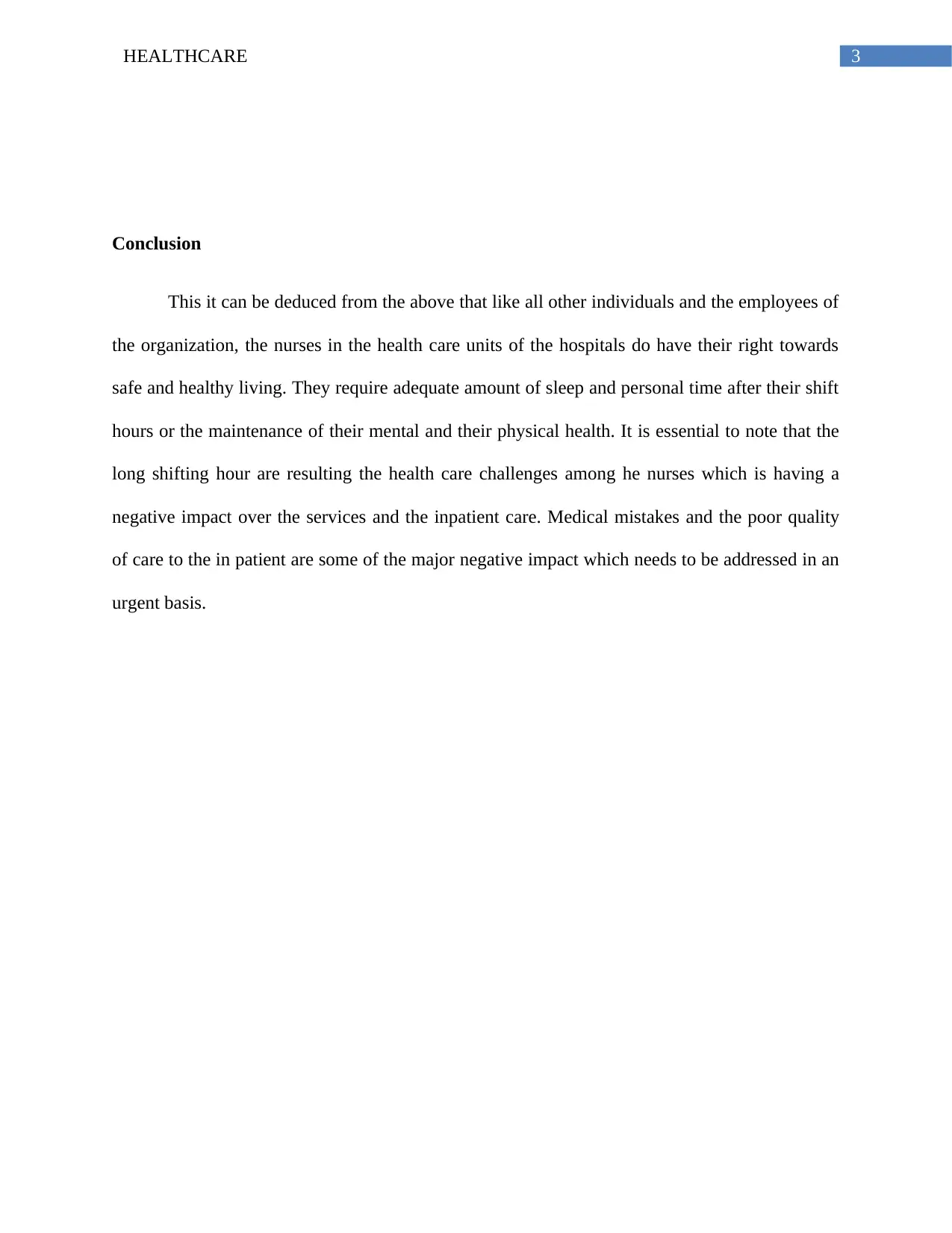
3HEALTHCARE
Conclusion
This it can be deduced from the above that like all other individuals and the employees of
the organization, the nurses in the health care units of the hospitals do have their right towards
safe and healthy living. They require adequate amount of sleep and personal time after their shift
hours or the maintenance of their mental and their physical health. It is essential to note that the
long shifting hour are resulting the health care challenges among he nurses which is having a
negative impact over the services and the inpatient care. Medical mistakes and the poor quality
of care to the in patient are some of the major negative impact which needs to be addressed in an
urgent basis.
Conclusion
This it can be deduced from the above that like all other individuals and the employees of
the organization, the nurses in the health care units of the hospitals do have their right towards
safe and healthy living. They require adequate amount of sleep and personal time after their shift
hours or the maintenance of their mental and their physical health. It is essential to note that the
long shifting hour are resulting the health care challenges among he nurses which is having a
negative impact over the services and the inpatient care. Medical mistakes and the poor quality
of care to the in patient are some of the major negative impact which needs to be addressed in an
urgent basis.
Paraphrase This Document
Need a fresh take? Get an instant paraphrase of this document with our AI Paraphraser
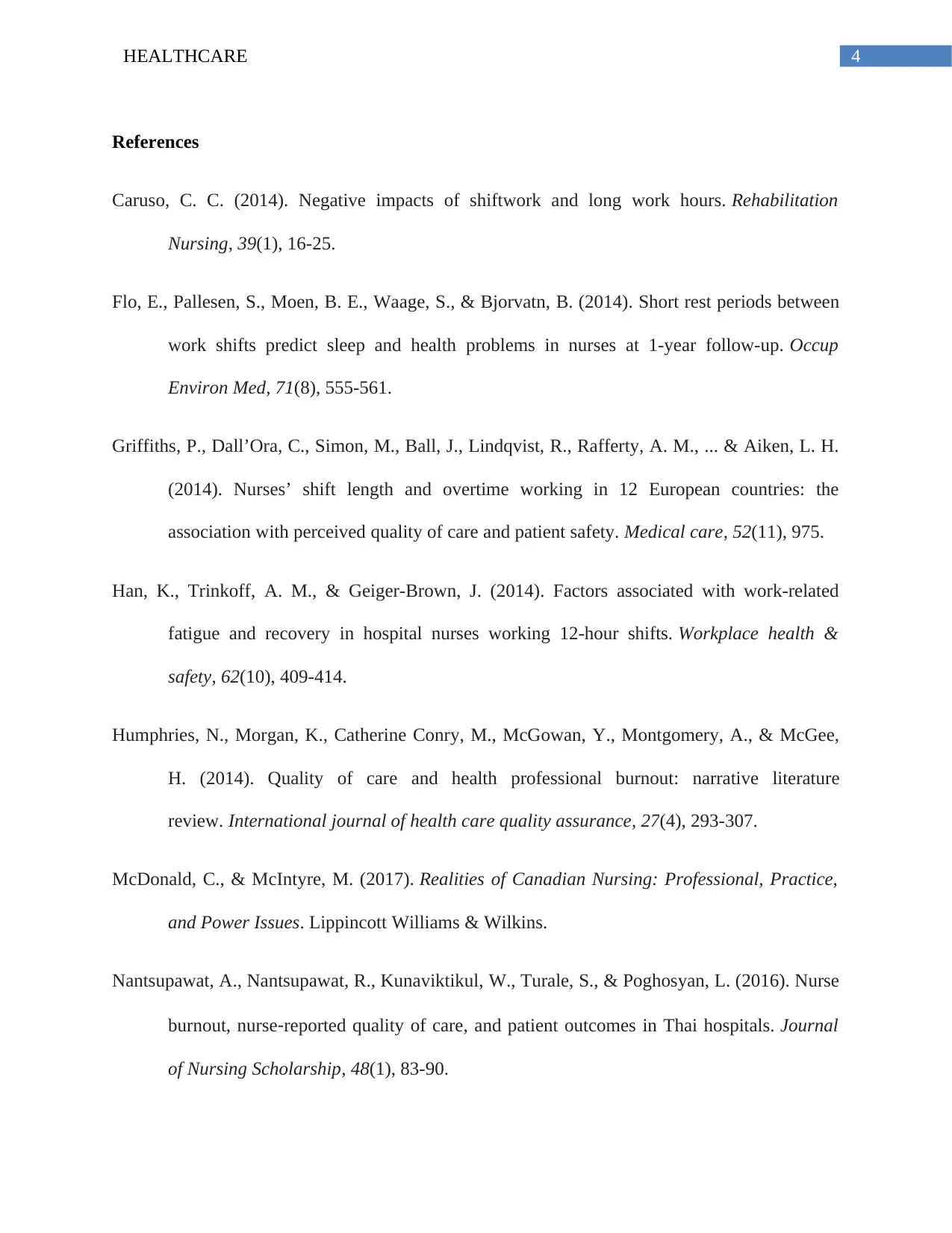
4HEALTHCARE
References
Caruso, C. C. (2014). Negative impacts of shiftwork and long work hours. Rehabilitation
Nursing, 39(1), 16-25.
Flo, E., Pallesen, S., Moen, B. E., Waage, S., & Bjorvatn, B. (2014). Short rest periods between
work shifts predict sleep and health problems in nurses at 1-year follow-up. Occup
Environ Med, 71(8), 555-561.
Griffiths, P., Dall’Ora, C., Simon, M., Ball, J., Lindqvist, R., Rafferty, A. M., ... & Aiken, L. H.
(2014). Nurses’ shift length and overtime working in 12 European countries: the
association with perceived quality of care and patient safety. Medical care, 52(11), 975.
Han, K., Trinkoff, A. M., & Geiger-Brown, J. (2014). Factors associated with work-related
fatigue and recovery in hospital nurses working 12-hour shifts. Workplace health &
safety, 62(10), 409-414.
Humphries, N., Morgan, K., Catherine Conry, M., McGowan, Y., Montgomery, A., & McGee,
H. (2014). Quality of care and health professional burnout: narrative literature
review. International journal of health care quality assurance, 27(4), 293-307.
McDonald, C., & McIntyre, M. (2017). Realities of Canadian Nursing: Professional, Practice,
and Power Issues. Lippincott Williams & Wilkins.
Nantsupawat, A., Nantsupawat, R., Kunaviktikul, W., Turale, S., & Poghosyan, L. (2016). Nurse
burnout, nurse‐reported quality of care, and patient outcomes in Thai hospitals. Journal
of Nursing Scholarship, 48(1), 83-90.
References
Caruso, C. C. (2014). Negative impacts of shiftwork and long work hours. Rehabilitation
Nursing, 39(1), 16-25.
Flo, E., Pallesen, S., Moen, B. E., Waage, S., & Bjorvatn, B. (2014). Short rest periods between
work shifts predict sleep and health problems in nurses at 1-year follow-up. Occup
Environ Med, 71(8), 555-561.
Griffiths, P., Dall’Ora, C., Simon, M., Ball, J., Lindqvist, R., Rafferty, A. M., ... & Aiken, L. H.
(2014). Nurses’ shift length and overtime working in 12 European countries: the
association with perceived quality of care and patient safety. Medical care, 52(11), 975.
Han, K., Trinkoff, A. M., & Geiger-Brown, J. (2014). Factors associated with work-related
fatigue and recovery in hospital nurses working 12-hour shifts. Workplace health &
safety, 62(10), 409-414.
Humphries, N., Morgan, K., Catherine Conry, M., McGowan, Y., Montgomery, A., & McGee,
H. (2014). Quality of care and health professional burnout: narrative literature
review. International journal of health care quality assurance, 27(4), 293-307.
McDonald, C., & McIntyre, M. (2017). Realities of Canadian Nursing: Professional, Practice,
and Power Issues. Lippincott Williams & Wilkins.
Nantsupawat, A., Nantsupawat, R., Kunaviktikul, W., Turale, S., & Poghosyan, L. (2016). Nurse
burnout, nurse‐reported quality of care, and patient outcomes in Thai hospitals. Journal
of Nursing Scholarship, 48(1), 83-90.
1 out of 5
Related Documents
Your All-in-One AI-Powered Toolkit for Academic Success.
+13062052269
info@desklib.com
Available 24*7 on WhatsApp / Email
![[object Object]](/_next/static/media/star-bottom.7253800d.svg)
Unlock your academic potential
Copyright © 2020–2026 A2Z Services. All Rights Reserved. Developed and managed by ZUCOL.





